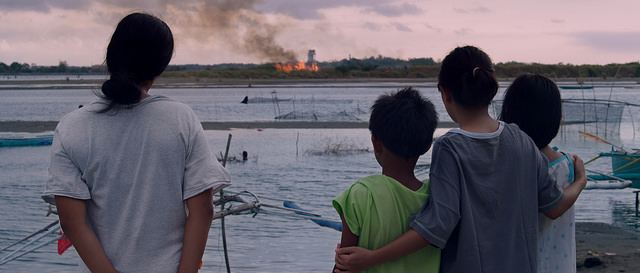You have no items in your cart. Want to get some nice things?
Go shoppingLav Diaz’s gargantuan Norte, The End of History is a furious, enthralling study of recent history’s effects on Philippine society.

Source: Flickr
There is the sense of an impending maelstrom sewn through the opening exchanges of Lav Diaz’s gargantuan Norte, The End of History. A four-hour state of the Philippine nation address, it begins with a glimpse into the entropic socio-political philosophy of self-styled absolutist, Fabian (played by Sid Lucero) who claims that politics is dead and that everything wrong with society should be destroyed. He’s a law school dropout and his rhetoric plays as pretentious waffle from a member of the country’s verbose intellectual elite. That notion is undercut somewhat, however, when he and his compatriots leave the comfort of their coffee shop sofa. Outside on the street they encounter a woman bleeding to death on the ground – Fabian’s impassive gaze strikes the first discordant note in the director’s furious and enthralling lament.
Diaz is a filmmaker that has, for decades, been associated with two recurring conceits that he once again combines to great effect in his latest work. His features are always vast and serene examples of ‘slow cinema’ – indeed, his next film clocks in at just less than six hours – and he is oft considered one of its most talented proponents. Equally as important to his oeuvre is the work of Fyodor Dostoyevsky, references to whom have littered his career be they direct or more obscure.
On this occasion, Diaz has returned to the fertile soil of Crime and Punishment to fashion himself a new Raskolnikov in the form of the aforementioned Fabian. In the novel, the original character feels compelled to murder a bitter old pawn-broker and is subsequently wracked with guilt and paranoia. Norte unfurls a similar premise, but the redemption of the novel is not afforded to the film’s Raskolnikov.
Like his forebear, Fabian is propelled towards his heinous crime; in this instance by his stark polarised worldview – though a mounting debt hardly absolves him of material motive. Brutally slaying the wickedly unpleasant moneylender, Magda (Mae Paner), and her young daughter, Fabian puts his philosophy into action. As this point, the narrative takes a turn from the source with the hopelessly unfortunate Joaquin (Archie Alemania) – another of Magda’s financially vulnerable clients – blamed for the crime. Earlier on the day of the murder, Joaquin had visited Magda in an attempt to reclaim a sentimentally valuable item that his wife, Eliza (Angeli Bayani), has previously pawned. Their meeting had ended in violence, so with few questions asked, the homicide is pinned on him and he is sentenced to spend the rest of his life in prison. Eliza remains at home, with a fruit cart and a family to feed.
Where Dostoyevsky’s novel concerns itself with the investigation and manhunt, there is no such drama here. What unfolds patiently over the proceeding hours is both Joaquin (and to an extent Eliza) and Fabian as different fractured elements of the Filipino national psyche – both condemned to unending imprisonment, or perhaps even an eternal hell. Joaquin is far more easy to like, as he sets about living his life behind bars with an otherworldly good grace, learning to take each and every trial and tragedy in his stride. Fabian’s attempts at finding peace are short-lived and he inflicts damnation upon himself, becoming grotesquely monstrous in the harrowing final act. Despite this, neither character is as black or white as Fabian’s viewpoint espouses. Neither proletariat nor intelligentsia are the cure to the sickness spreading over the land, even if angel and devil seem the apposite touchstones.
It is common with films of such breadth and heft for commentary to remark on how quickly time passes given the ungainly length; this would be imprudent in the case of Norte. Its massive runtime does not fly by; the narrative outlined above slowly percolates throughout the rhythmic four hours that often have more interesting, if less obvious themes to tackle. This is another work of staggering aspiration from Lav Diaz, exploring the effects that recent history has had on the people of his country, pitting political views against one another whilst equally questioning the role of religion and God in his own culture and society.
This is only sparsely done through dialogue and debate; the preference is to painstakingly play out sequences from which one can infer and interpret the concerns of the artist. Diaz and his cinematographer Lauro Rene Manda not only present the arresting elegance of the country, but with their unobtrusive, slowly gliding camera, they capture the gentle poetry of life, even in the most arduous of circumstances. The challenge of teasing a positive hopeful message from Norte, the End of History is not an enticing one, but there’s a astonishing beauty in amongst the desperation and depravity. It’s not an easy watch, but it truly is magnificent – an incredibly rich and rewarding experience if given the opportunity.
About Ben Nicholson
A compulsive cinephile, Ben fell in love with film through repeated viewings of Michael Jackson being transformed into a werewolf behind the scenes of John Landis' seminal video for Thriller. This passion has manifested itself in his consumption of movies and the enjoyment derived from reading, discussion and writing about cinema which can all be found on New Urbanite. His favourite films include The Third Man, In The Mood For Love, Badlands, 3 Iron, Casablanca, Ran, and Last Year in Marienbad - to name but a few.




